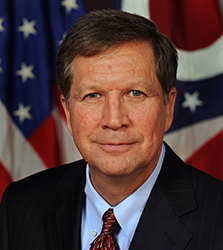
Kasich Moving Up
Less than a month ago, the main question regarding Ohio Gov. John Kasich was whether he would qualify for one of the 10 slots available to GOP candidates for the first debate, which was held in his home state of Ohio. Now, as Politico reports, he’s surging in the polls in New Hampshire and posing a direct challenge to former Florida Gov. Jeb Bush for one of the top spots in the field:
Kasich putting the squeeze on Jeb
In just a few weeks, things aren’t looking bad — he squeaked into the prime-time debate last Thursday and delivered a solid performance, he scored the clutch endorsement this week of Tom Rath, a prominent New Hampshire GOP operative, and that double-digit gap between Kasich and Bush? Gone, with the two establishment Republicans now in a statistical tie, according to a New Hampshire poll released on Tuesday….
There are signs of a few knee trembles in the Bush campaign. Not outwardly or obviously, of course. The Bush camp says it’s focused on driving its own agenda and will be spending ample time in New Hampshire along the way….
One Bush ally, though, threw a subtle elbow Wednesday. Ana Navarro, a longtime Bush friend, tweeted that Kasich’s recent climb to third in a New Hampshire poll — behind Donald Trump and neck-and-neck with Bush — was a sign he was pulling support from New Jersey Gov. Chris Christie, a dig suggesting he’s just cannibalizing another back-of-the-pack contender but one that seemed intended to mask Bush world’s growing concern.
Another story on Kasich’s growing support in the Granite State, this one from The New York Times, suggests he’s appealing primarily to moderate Republicans, potentially drawing voters away from Bush and New Jersey Gov. Chris Christie:
Just a month after entering the race, Mr. Kasich is rising in the polls in New Hampshire, winning head-turning endorsements and drawing new voters to his events who were impressed with his debate performance last week. And his gains could have a significant ripple effect on the Republican primary in this state and beyond, because he is appealing to many of the same voters that former Gov. Jeb Bush of Florida and Gov. Chris Christie of New Jersey are targeting.
Mr. Kasich, whose apostasies include supporting a pathway to legal status for illegal immigrants and the Common Core education standards, may never become the Republican standard-bearer. But for all the speculation about how Mr. Bush’s difficulties with conservatives could sink him in the primary, the threat from the left that Mr. Kasich poses could present just as significant an obstacle to Mr. Bush, who is counting on a victory in New Hampshire to absorb possible losses in Iowa and South Carolina, the more conservative of the other early nominating states.
Mr. Kasich’s potential here is a product of New Hampshire’s unusual nature. While the moderate wing of the Republican Party is on the verge of extinction in much of the country, it endures in a state that is resolutely anti-tax but more secular than much of the South and Midwest. Further, unaffiliated voters in New Hampshire can participate in either party’s presidential primary, a tradition that in the past has elevated unorthodox Republicans such as Senator John McCain to success.
In 2012, 48 percent of voters in the Republican primary called themselves moderate or liberal. Even in 2008, when they could have chosen to vote in the hard-fought Democratic primary instead, 45 percent of Republican voters described themselves as moderates or liberals.
One of the keys to success in New Hampshire, for Kasich or any other candidate in either party trying to appeal to more centrist voters, could be whether independents (who can vote in either primary) decide to vote predominantly in one party’s contest or generally split between the parties:
The competition for centrist voters is even more significant because it is uncertain how many of them will be up for grabs in the Republican race. With Mrs. Clinton facing a growing challenge from the left from the socialist next door, Senator Bernie Sanders of Vermont, she may need to corral many moderate, unenrolled voters into the Democratic primary to try to ensure her success.
“I would have said two months ago that our side is going to get 250,000 undeclared voters, because they go where the action is,” said David Carney, a New Hampshire-based Republican strategist. “But I don’t know now, because Bernie is making it a race in New Hampshire.”
The issue of whether independent voters show up predominantly in one party’s primary over the other, or instead decide to split between the two parties, will likely keep candidates appealing to centrist voters on edge right up until the last votes in New Hampshire are cast next Feb. 9. More importantly, it will probably elevate at least one candidate’s hopes while crushing several others.
Kasich has pinned his hopes on winning or at least finishing near the top in the New Hampshire primary, and he seems to be positioned to do just that. His next challenge will be bringing his support up in other early voting states as well while establishing himself nationally – if not in the first tier of candidates, then at least in the second tier composed of those ready to move up with just a few “lucky” breaks.



